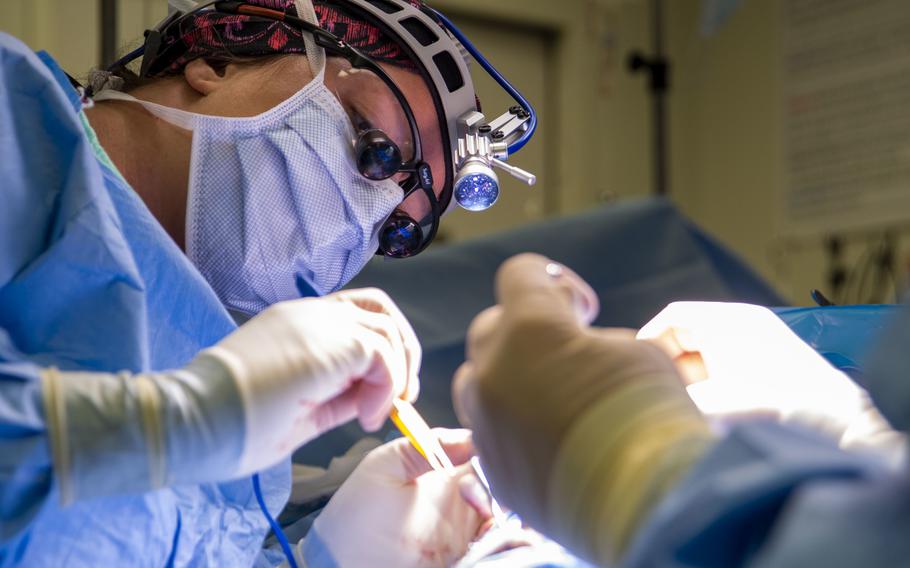
Lt. Cmdr. Katie Topping, an ophthalmologist assigned to Navy Medicine Readiness and Training Command (NMRTC) San Diego, performs the Navy’s first corneal neurotization procedure in the hospital’s main operating room complex in October 2021. The Department of Veterans Affairs is considering scrapping long-standing policy that only surgeons provide surgical eye care in VA facilities. As an ophthalmologist and a Vietnam veteran, I’m shocked and disappointed that the VA would even consider allowing nonphysicians to perform laser eye surgery on me and my fellow veterans. (Luke Cunningham/U.S. Navy)
The Department of Veterans Affairs is considering scrapping long-standing policy that only surgeons provide surgical eye care in VA facilities. As an ophthalmologist and a Vietnam veteran, I’m shocked and disappointed that the VA would even consider allowing nonphysicians to perform laser eye surgery on me and my fellow veterans.
Last year the VA changed its Community Care guidelines by removing language that allows only ophthalmologists to perform surgery. Now the VA is developing new national standards of practice for optometry that may allow optometrists to perform surgery on millions of U.S. military veterans across the country in all VA health facilities. Optometrists are an essential part of a veteran’s eye care team, but they are trained to provide primary eye care, not surgical care.
The VA acknowledged this fact in 2004, when it estab¬lished a policy that laser eye surgery could only be done by an ophthalmologist. The agency reviewed and reaffirmed this position three times since; in 2009, 2015 and again in 2020. Even in the few states that allow optometrists to perform laser eye surgery, only ophthalmologists perform these procedures at VA health facilities.
A national standard would override existing state laws, upending state-based licensure and oversight of health care professionals. Nearly 90% of the U.S. population currently lives in a state that does not allow optometrists to perform surgery. From California (home to the most veterans in the country) to Nebraska, state legislatures have rejected bills that would have allowed optometrists to perform surgery on their residents.
The reason is obvious: Surgery should be done by surgeons.
Ophthalmologists complete a minimum of four years of medical school and four years of residency. Residents learn at the side of a board-certified ophthalmologist. First watching the surgeon perform surgery, then assisting, then doing parts of the procedure themselves before they can attempt to perform a procedure on their own. It takes a minimum of 17,000 hours of training to perform eye surgery safely.
In contrast, optometry school is a four-year degree program focusing on primary eye care. They are trained to provide routine eye exams and vision tests, prescribing and fitting eyeglasses and contact lenses, monitoring eye conditions related to diseases such as diabetes, and providing low-vision aids.
In fact, 95.3% of optometry students study in states where it’s illegal for them to perform surgery. So, they train on plastic or rubber models, not on real patients with real conditions. There’s just no comparison. Real tissue bleeds and eyes move, making it harder to perform laser surgery or suture an incision.
The shocking reality is that allowing optometrists to perform eye surgery at VA facilities or through the VA’s Community Care Program means that the first human subject an optometrist performs surgery on could be a veteran.
Why overturn a policy that has protected veterans for 20 years? There are no documented reports of veterans unable to access laser eye surgery within the VA.
The VA employs more than a thousand ophthalmologists who provide ready access to high-quality surgical eye care for our nation’s veterans. The Community Care Program also provides veterans with timely access to medical services when the VA cannot provide the care needed. Combined, these programs support the VA’s core strategy of providing high-quality, veteran-centered care.
Allowing optometrists to perform eye surgery in the VA would not solve problems associated with efficiency. While there are regional variations, overall, more than 90% of the U.S. Medicare beneficiary population lives within a 30-minute drive of an ophthalmologist and a 15-minute drive of an optometrist.
Eye tissue is delicate. Once damaged, it’s hard to repair. Many veterans have complex eye conditions resulting from advanced age or service to our country.
A national standard that puts a laser or scalpel in the hands of a provider who doesn’t have the medical education or surgical training to be a surgeon would put our nation’s veterans at considerable risk for vision loss. We won’t let those who fought for our country be subjected to a lower standard of care at the VA.
The VA must retain its 20-year policy, and it should immediately reinstate the Community Care guidelines that have long protected our veterans so they can continue to receive the highest level of surgical eye care from trained ophthalmologists.
Dr. Michael W. Brennan is a past president of the American Academy of Ophthalmology. He also served as an Army aviator in Vietnam, and as chief of surgery at Fort Bragg (now Fort Liberty), N.C.